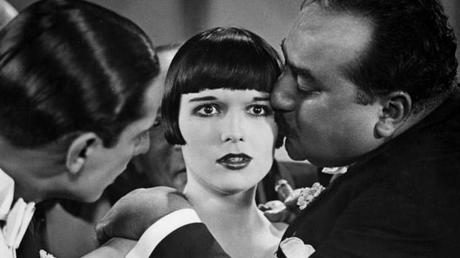
On the day of her confirmation, Thymian (Lousie Brooks) is given a diary as a gift. It was also the day her life started a downward slide. She’s the daughter of a pharmacist who can never resist having affairs with the family’s housekeepers. When the latest one, Barbara, is pregnant, she’s sent away, but Thymian doesn’t know why. Barbara later commits suicide and when her body is brought back to their home, Thymian is understandably upset. That night, her father’s business partner Meinert (Fritz Rasp) comes to console her, then rapes her, which results in Thymian having a child out of wedlock. She never admits who the father is, so her family reads her diary to learn the truth. They want her to marry Meinert, but she refuses, so they take her child away from her and send her to reform school.
Life in the reform school is brutal and Thymian desperately wants to get out. She gets in touch with a friend, Count Orsdoff (Andre Roanne), who has also fallen on hard times. He had been supported by a wealthy uncle, but was cut off when he fails to succeed at any subject in school. She tries to get him to talk her father into getting her out, but he’s just married Meta (Franziska Kinz), the family’s new housekeeper, and doesn’t want Thymian around. Instead, Orsdoff helps Thymian and her friend Erika (Edith Meinhard) escape.
The first thing Thymian wants to do is see her child, but finds out the baby has died. With no one to take care of her and no job skills, she and Erika become prostitutes. One night, her father, Meta, and Meinert see her in a nightclub in the city and are shocked to see what’s become of her. But shortly afterward, Thymian’s father passes away, leaving her as sole heir. She stands to inherit a lot of money since Meinert is buying her father’s share of the pharmacy and she plans to use her money to start a new life. She even plans to marry Orsdoff so she can have a new identity and help Ordoff start a new life. But when she sees that Meta and her two young children have been left with no money and no place to go, she decides to give them the money because she doesn’t want the children to wind up like her.
Since Ordoff now isn’t able to start over in life, he kills himself. Ordoff’s uncle feels terribly guilty for disowning him and decides to make up for it by taking care of Thymian and helping her start over. She earns a more respectable place in society and people start trying to get her involved in charities — including the reform school she was once imprisoned in.
Diary of a Lost Girl really ought to have been titled Diary of a Lost Girl: Men are Terrible. Everything bad that happens to poor Thymian is the result of being forced to be around terrible men like her father, Meinert, and the super creepy warden at the reform school. This movie is definitely not short on melodrama and Louise Brooks gives a wonderful performance in it. She’s absolutely radiant and lights up a screen like few other stars ever could. Brooks greatly benefits from G.W. Pabst’s direction; they were such a great actress/director pair, like Dietrich and Von Sternberg or de Mille and Gloria Swanson. If you liked Pandora’s Box, you’ll probably also like Diary of a Lost Girl. Between Brooks’s performance and Pabst’s direction, Diary of a Lost Girl remains entertaining and compelling and stands apart from being ordinary melodrama.
